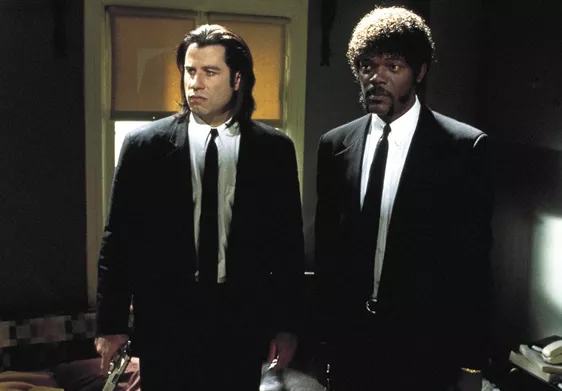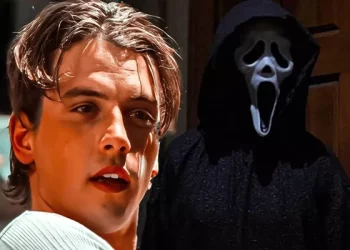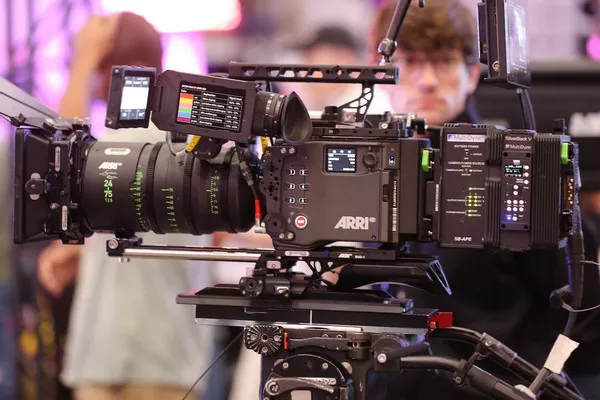What is the movie “Pulp Fiction” about? This question has lingered in the minds of cinephiles and critics alike since the film’s release in 1994. Directed by Quentin Tarantino, “Pulp Fiction” is a groundbreaking piece of cinematic art that defies traditional narrative structures. To truly understand the movie’s essence, one must delve into its intricate storytelling, unique characters, and the cultural impact it has left on the film industry.
The Nonlinear Narrative
At the core of “Pulp Fiction” lies its unconventional narrative structure. The film is divided into multiple interconnected storylines, a technique that challenges the linear progression commonly found in mainstream cinema. What is the movie “Pulp Fiction” about in terms of its narrative structure? It weaves together the lives of hitmen Vincent Vega (John Travolta) and Jules Winnfield (Samuel L. Jackson), the boxer Butch Coolidge (Bruce Willis), and other eccentric characters. The non-linear approach allows Tarantino to present events out of chronological order, creating a mosaic of intriguing, overlapping stories that demand the viewer’s active engagement.
Philosophical Themes
What is the movie “Pulp Fiction” about when it comes to its underlying philosophical themes? Tarantino blends elements of crime, humor, and existentialism to craft a narrative that transcends traditional genre boundaries. The film grapples with concepts of morality, redemption, and the randomness of fate. Through the character of Jules, who undergoes a transformative experience, the film explores the possibility of redemption in a world filled with violence and moral ambiguity. This philosophical depth adds layers to the movie, elevating it beyond a mere crime drama.
Characterization and Dialogue
“Pulp Fiction” is renowned for its memorable characters and sharp, witty dialogue. What is the movie “Pulp Fiction” about in terms of its characters? Each character is meticulously crafted, contributing to the film’s richness. Vincent Vega, with his dance moves and philosophical ponderings, becomes an emblematic figure. The dialogue, infused with pop culture references and humor, has become iconic. This attention to character and dialogue not only propels the narrative but also establishes “Pulp Fiction” as a cultural touchstone in the realm of cinema.
See Also: Why is “Interstellar” a Masterpiece?
Pop Culture References
Tarantino, known for his love of cinema, infuses “Pulp Fiction” with an array of pop culture references. What is the movie “Pulp Fiction” about when it comes to its engagement with popular culture? It serves as a homage to various film genres, including crime, noir, and even the musical. The eclectic soundtrack, featuring surf rock and soul music, further enhances the film’s cultural resonance. By seamlessly integrating these references, Tarantino creates a cinematic experience that pays tribute to the medium’s history while forging new ground.
Violence as Cinematic Art
One cannot discuss “Pulp Fiction” without addressing its visceral and stylized depiction of violence. What is the movie “Pulp Fiction” about in terms of its portrayal of violence? Tarantino uses violence not merely as a plot device but as a form of cinematic art. The famous “dance of death” scene, where Vincent Vega and Mia Wallace (Uma Thurman) enter a twist contest, is a prime example of how Tarantino transforms a potentially violent encounter into a captivating and unexpected moment. This approach to violence has sparked debates about its moral implications and artistic merits.
Impact on Filmmaking
“Pulp Fiction” had a profound impact on the landscape of filmmaking. What is the movie “Pulp Fiction” about when it comes to its influence on the industry? Its success revitalized independent cinema and ushered in a new era of bold, auteur-driven filmmaking. The film’s non-linear narrative structure, eclectic soundtrack, and unconventional characters inspired a generation of filmmakers to push boundaries and experiment with storytelling. Tarantino’s bold approach to genre and narrative structure became a template for those seeking to challenge cinematic norms.
Critical Reception and Awards
Despite its unconventional style, “Pulp Fiction” received widespread critical acclaim upon its release. The film was lauded for its originality, clever dialogue, and exceptional performances. What is the movie “Pulp Fiction” about when it comes to its awards and recognition? It garnered numerous accolades, including the Palme d’Or at the Cannes Film Festival and seven Academy Award nominations. While it didn’t sweep the Oscars, its impact on popular culture and the cinematic landscape was undeniable.
Cultural Legacy
Over the years, “Pulp Fiction” has solidified its place in popular culture. What is the movie “Pulp Fiction” about when considering its enduring legacy? The film continues to be celebrated and referenced in various forms of media. Its characters, dialogue, and iconic moments have permeated the collective consciousness. Lines like “Say ‘what’ again!” and the image of Uma Thurman and John Travolta dancing are etched into the cultural lexicon. “Pulp Fiction” remains a touchstone for filmmakers and audiences alike, a testament to its lasting impact.
Conclusion
In conclusion, the question of “What is the movie “Pulp Fiction” about?” does not yield a straightforward answer. Tarantino’s magnum opus is a complex tapestry of interconnected stories, philosophical musings, and cinematic innovation. Its influence on filmmaking, from narrative structures to the use of violence as an art form, is indelible. “Pulp Fiction” is not merely a film; it is a cultural phenomenon that continues to captivate and inspire audiences, inviting them to explore the intricacies of its narrative and uncover new layers with each viewing.
























